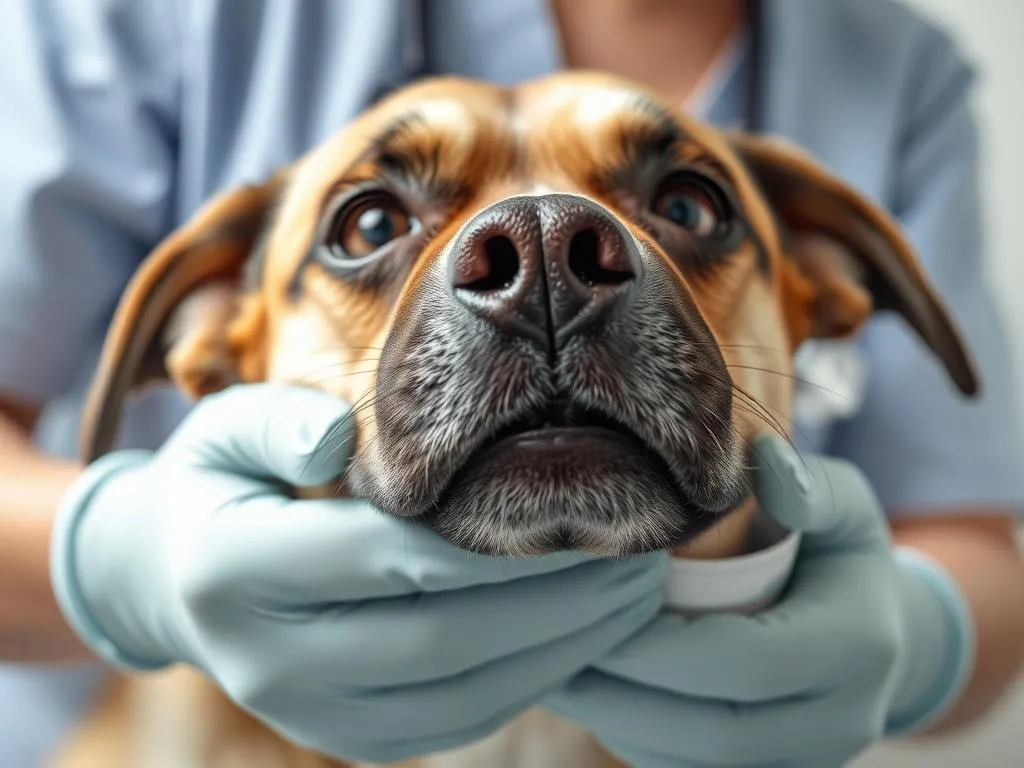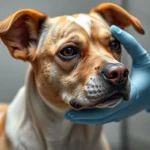
Introduction
As a dog owner, nothing can be more concerning than discovering that your furry friend has developed a stinky dog face. This issue not only affects your dog’s comfort and well-being but can also impact your enjoyment of their company. Addressing the odor is crucial, as it often points to underlying health issues that require attention.
Common causes of odor in dogs include dental problems, skin infections, dietary factors, and even more serious medical conditions. Understanding these causes is the first step toward effective treatment.
Understanding the Causes of Stinky Dog Face
Dental Issues
One of the primary culprits behind a stinky dog face is poor dental hygiene. Just like humans, dogs can suffer from dental issues that lead to foul odors. Tartar buildup is a common problem, which can progress to gum disease if not addressed.
Signs of dental problems include:
- Bad breath
- Red or swollen gums
- Difficulty eating or chewing
- Excessive drooling
Regular dental care, including brushing your dog’s teeth and providing dental chews, can help prevent these issues.
Skin Conditions
Skin infections and allergies can also contribute to a smelly face. Conditions like dermatitis, which can be caused by allergens, parasites, or infections, often result in redness, itching, and a distinctive odor.
Signs of skin issues include:
- Redness or inflammation
- Excessive scratching or biting at the skin
- Greasy or flaky skin
If you notice any of these signs, it’s essential to consult your veterinarian for proper diagnosis and treatment.
Ear Infections
The connection between ear health and facial odor is significant. Ear infections can produce a strong, unpleasant smell that may extend to the face. Dogs with ear infections often exhibit certain behaviors, such as scratching at their ears or shaking their heads frequently.
Symptoms of ear infections include:
- Foul-smelling discharge from the ears
- Redness or swelling in the ear canal
- Excessive shaking of the head
If you suspect an ear infection, a vet visit is essential to prevent further complications.
Dietary Factors
Diet plays a crucial role in your dog’s overall health and can significantly impact their odor. Low-quality dog food, certain fillers, or even specific protein sources can lead to unpleasant smells. Fish-based diets, for example, can sometimes cause a strong odor.
Dietary changes that may help include:
- Switching to high-quality dog food with natural ingredients
- Avoiding fillers and artificial additives
- Considering limited-ingredient diets for dogs with food sensitivities
Consulting with your vet about the best dietary options for your dog can help alleviate odor issues.
Other Medical Conditions
In some cases, systemic health issues may be the root cause of a stinky dog face. Conditions such as kidney disease or diabetes can produce unique odors due to changes in metabolism or body function.
Recognizing additional symptoms is vital:
- Increased thirst or urination
- Weight loss or gain
- Lethargy or changes in behavior
If you observe these symptoms alongside a persistent odor, it’s crucial to seek veterinary care immediately.
When to Consult a Vet
Recognizing Serious Symptoms
Knowing when to consult a vet is essential for your dog’s health. If your dog has a persistent odor that doesn’t improve with basic hygiene, or if you notice swelling, redness, or unusual behavior, it’s time to seek professional help.
Guidelines for seeking veterinary assistance include:
- If the odor persists despite regular cleaning
- If you notice any swelling or discharge
- If your dog appears to be in pain or discomfort
Waiting too long can lead to more severe health issues, so don’t hesitate to reach out to your vet.
Preparing for the Vet Visit
When you do visit the vet, preparation can make the appointment more effective. Take note of the specifics regarding your dog’s odor, including:
- How long the odor has been present
- Any changes in behavior or appetite
- Other symptoms you’ve noticed
Having this information ready can help your vet diagnose the issue more quickly. Additionally, come prepared with questions about potential treatment options and preventive care.
Home Remedies and Preventive Care
Basic Hygiene Practices
Maintaining good hygiene is crucial in managing a stinky dog face. Regular brushing and dental care can significantly reduce odor.
Hygiene tips include:
- Brush your dog’s teeth at least two to three times a week.
- Use dog-friendly toothpaste to promote oral health.
- Bathe your dog regularly with a gentle shampoo, focusing on the face area.
Diet Adjustments
Diet plays a pivotal role in controlling odor. Consider making dietary adjustments if you suspect that your dog’s food is contributing to the smell.
Recommendations for dietary changes:
- Switch to high-quality kibble or wet food.
- Introduce fresh vegetables or fruits as treats, ensuring they are dog-safe.
- Consult your vet about appropriate supplements that can improve skin and coat health, such as Omega-3 fatty acids.
Homemade Solutions
There are several safe, homemade solutions you can create to help manage odors.
Simple recipes include:
- Dog-friendly wipes: Mix water with a few drops of dog-safe essential oils (like lavender) to create a refreshing wipe for your dog’s face.
- Natural sprays: Combine equal parts of apple cider vinegar and water in a spray bottle and lightly spritz your dog’s face to help neutralize odors.
Always ensure any homemade solutions are safe for your dog, and consult your vet if unsure.
Vet-Approved Treatments
Professional Cleaning
If home remedies and basic hygiene aren’t enough, professional cleaning may be necessary. Dental cleanings by a veterinarian can significantly improve oral health and reduce odor.
Other professional cleaning options include:
- Ear cleaning to remove wax buildup and prevent infections.
- Skin treatments for infections or allergies, tailored to your dog’s specific needs.
Medications and Topical Treatments
Your vet may prescribe medications to address underlying issues contributing to the odor. Common treatments include:
- Antibiotics for bacterial infections.
- Antifungals for yeast infections.
- Topical creams or ointments for skin conditions.
Following your vet’s instructions carefully is essential for effective treatment.
Long-term Management Strategies
Preventive care is key to managing a stinky dog face over the long term. Regular vet check-ups allow for early detection of potential issues before they escalate.
Long-term strategies include:
- Scheduling routine dental cleanings every six months.
- Regular skin evaluations to catch any developing issues.
- Consistent monitoring of your dog’s diet and health status.
Success Stories and Testimonials
Case Studies
Many dog owners have successfully tackled odor issues with the help of veterinary care. For instance, a Labrador Retriever named Max struggled with persistent facial odor due to an untreated ear infection. After a thorough examination and treatment, Max’s odor significantly diminished, and he became a happier, healthier dog.
Owner Testimonials
Owners often share their experiences about how addressing their dog’s odor issues led to positive changes. One owner remarked, “After taking my dog to the vet for his stinky face, we discovered he had gum disease. After treatment, not only did his breath improve, but he became much more playful and energetic!”
Such stories emphasize the importance of seeking professional guidance.
Conclusion
Addressing a stinky dog face is not just about improving your dog’s smell; it’s about ensuring their overall health and comfort. Identifying the underlying causes of odor is essential, and veterinary consultation plays a crucial role in effective treatment.
Taking proactive steps, such as maintaining hygiene, adjusting diet, and seeking regular veterinary care, can make a significant difference in your dog’s well-being. Remember, your dog relies on you for the best care possible, so don’t hesitate to reach out to your veterinarian when needed.
FAQs
What are the most common causes of a stinky dog face?
Common causes include dental issues, skin infections, ear infections, dietary factors, and other medical conditions.
How often should I clean my dog’s face?
Regular cleaning, at least once a week, is recommended to remove debris and prevent odors.
When should I be concerned about my dog’s odor?
If the odor is persistent, worsening, or accompanied by other symptoms like swelling or behavior changes, consult your vet.
Are there any home remedies I should avoid?
Avoid using any human products that may be toxic to dogs. Always check with your vet before trying new remedies.
What are the long-term solutions for ongoing odor issues?
Regular vet check-ups, maintaining dental hygiene, and high-quality diet adjustments are essential for long-term management.









